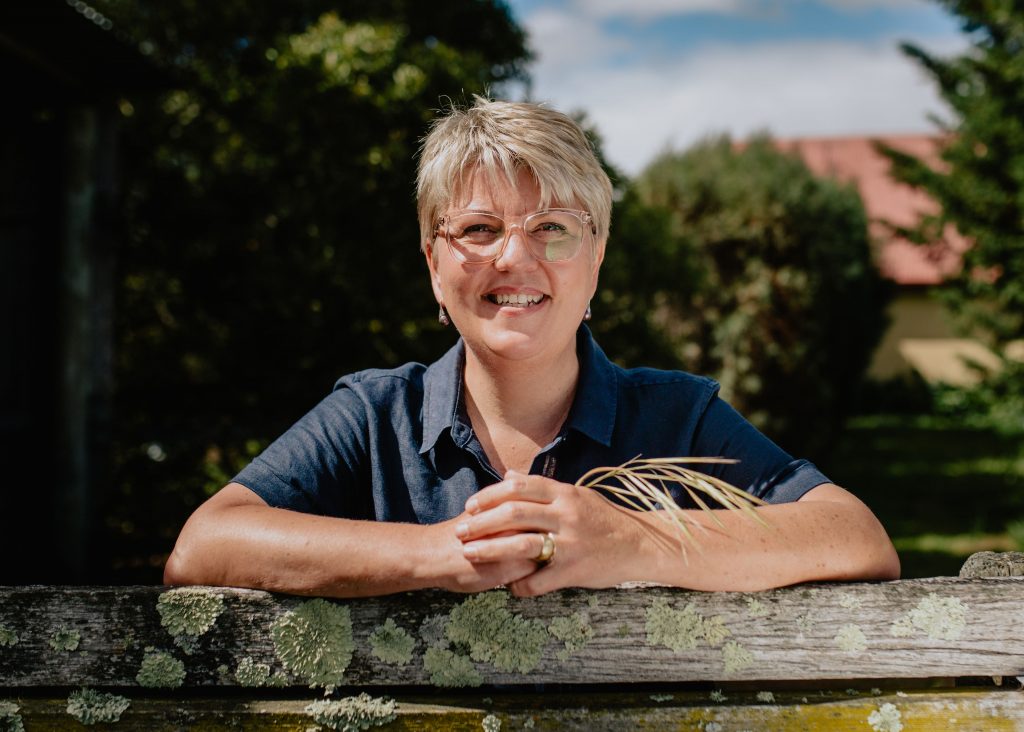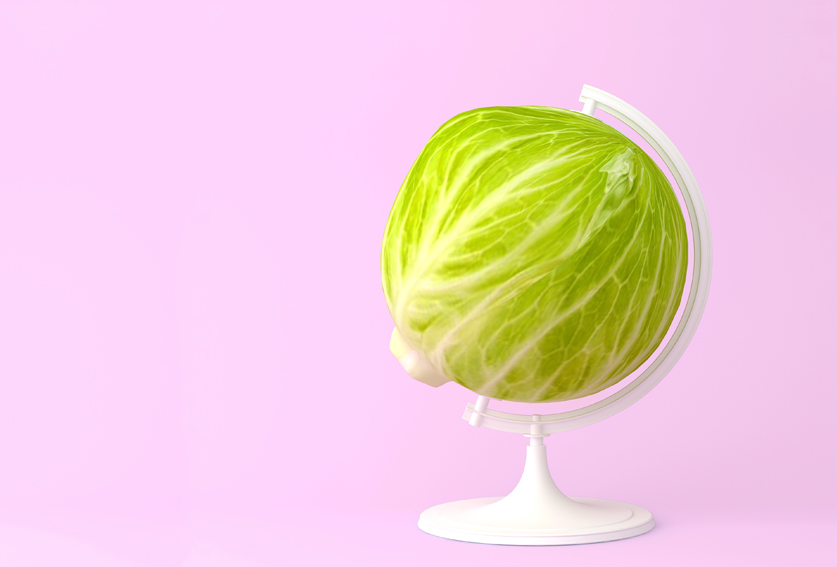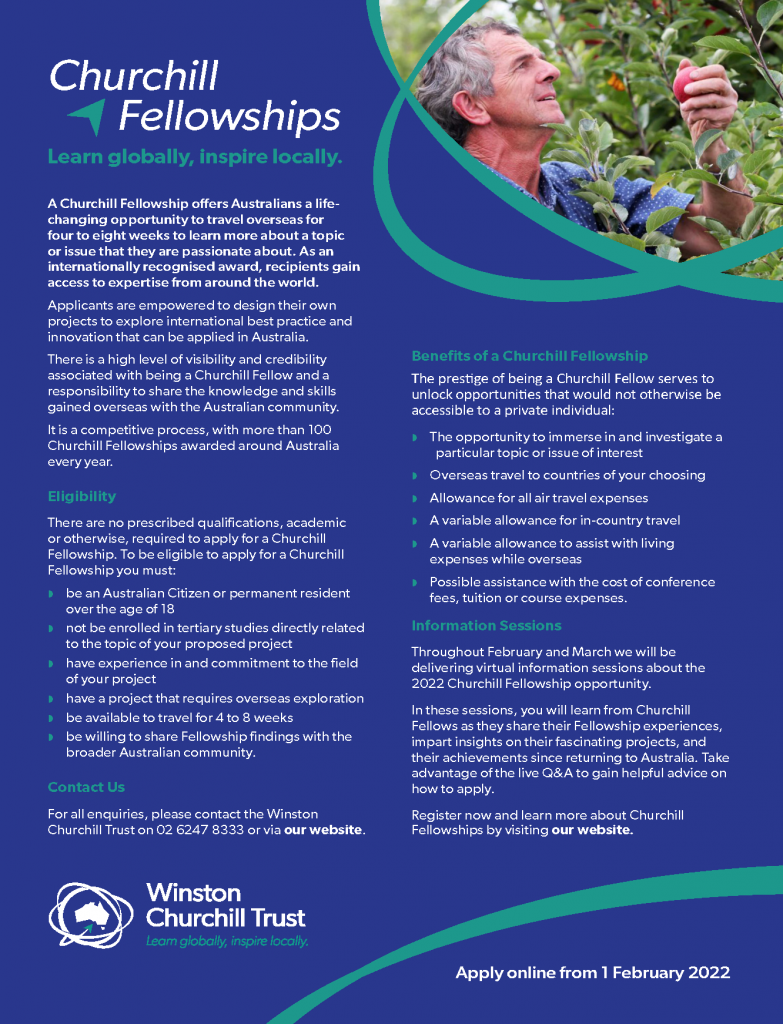Churchill Trust special information sessions for horticulture sector
A non-academic program that offers everyday Australians inspiring opportunities to travel overseas and investigate a topic they are passionate about is running two dedicated virtual information sessions for potential applicants involved in primary industries and food production.
After pausing last year because of COVID-19, the Churchill Trust plans to select around 100 people from diverse walks of life to undertake projects in 2023. As Churchill Fellows, the recipients will receive an average of $28,000 each and Trust support to explore international best practice and innovations in a field of their choosing.
A series of virtual information sessions based around particular themes will be held during February and March to help inspire ideas and guide people through the application process.
The series will kick off on Tuesday 1 February, when former ABC Landline reporter Prue Adams will host a session for people involved in any aspect of agriculture and food production, including growers and producers, value-adding enterprises, advisers and scientists. A second session with a particular focus on horticulture and viticulture will be held on Monday 21 February.
“We are excited to once again being able to offer this life-changing experience for Australians,” Trust CEO Adam Davey said.
“We received a ten per cent increase in applications during our last round in 2020 despite the emerging pandemic, and the Trust is hopeful of an equally strong response this year.
“People who apply will not travel until next year, and we will work with them to navigate travel requirements.”
No specific qualifications are required to receive a Churchill Fellowship, and Fellowships are not used to undertake formal academic study. Instead, recipients spend four to eight weeks visiting, observing and working alongside leaders in their sector.
The precise topic of focus is completely up to the applicant, who designs their own itinerary. However, applicants are expected to have worked through the issue thoroughly in Australia, exhausting locally available knowledge. Importantly, they must also demonstrate potential benefits to their sector or community, and be willing to share the findings on their return.
“Fellows may travel for as little as a month but the experience can change the rest of their lives,” Mr Davey said.
“They return with valuable networks, greater confidence and the motivation to achieve what they never thought possible. As a result, the combined impact on Australian communities since the first Fellowships were awarded in 1965 has been extraordinary.”
Mr Davey encouraged anyone with project idea to register for a virtual information session, even if they weren’t certain travel would be possible next year. Each session will feature existing Churchill Fellows sharing their experiences, as well as live Q&As to provide valuable advice on preparing an application.
The February 1 session will feature Tasmanian food scientist and entrepreneur Dr Hazel MacTavish-West, and dairy industry supply chain manager Tim Roache, who received Fellowships in 2017.

Dr MacTavish-West travelled to Europe to explore opportunities for incorporating more vegetables and fruit into value-added, convenient and healthy foods. The life-changing experiencing has led to her working with hundreds of agri-food businesses across Australia, and shaping the strategic direction of the Fast Moving Consumer Goods (SMCG) sector.
The fourth-generation of a dairy farming family in south-west Victoria, Tim Roache is national supply manager for Fonterra. He travelled to New Zealand, the United States and Europe to investigate milk pricing models and approaches that might help manage price risk in the Australian dairy market.
The session on 21 February will feature trailblazing wine industry consultant and 2017 ASVO Australian Winemaker of the Year, Mike Hayes, from Queensland, and Tasmanian orchardist Sally Dakis.
Mr Hayes completed his Fellowship in 2013, visiting 50 wine regions in Europe looking for alternative varieties to tackle climate change. His research led him to create the Vineyard of the Future project.
A rural journalist for 30 years, Ms Dakis operates a cherry and peony farm in the Coal River Valley. She travelled to Singapore, the United States and Europe to explore value adding and marketing of niche and bulk cherry products in the food processing industry.
Around 110 Fellowships were awarded in 2020 with a combined value of more than $3 million. Aside from general Fellowships, specific national and state-based sponsored Fellowships are being offered this year in a range of fields.
They include the new Saskia Beer Churchill Fellowship to investigate artisanal food production and small-scale farming, and the Hort Innovation Australia Churchill Fellowship to cultivate new ideas in horticulture.
Applications can be made online from 1 February 2022, closing 28 April 2022.
Registration for the virtual sessions is essential. To book and for more information visit churchillfellowships.com.au.


